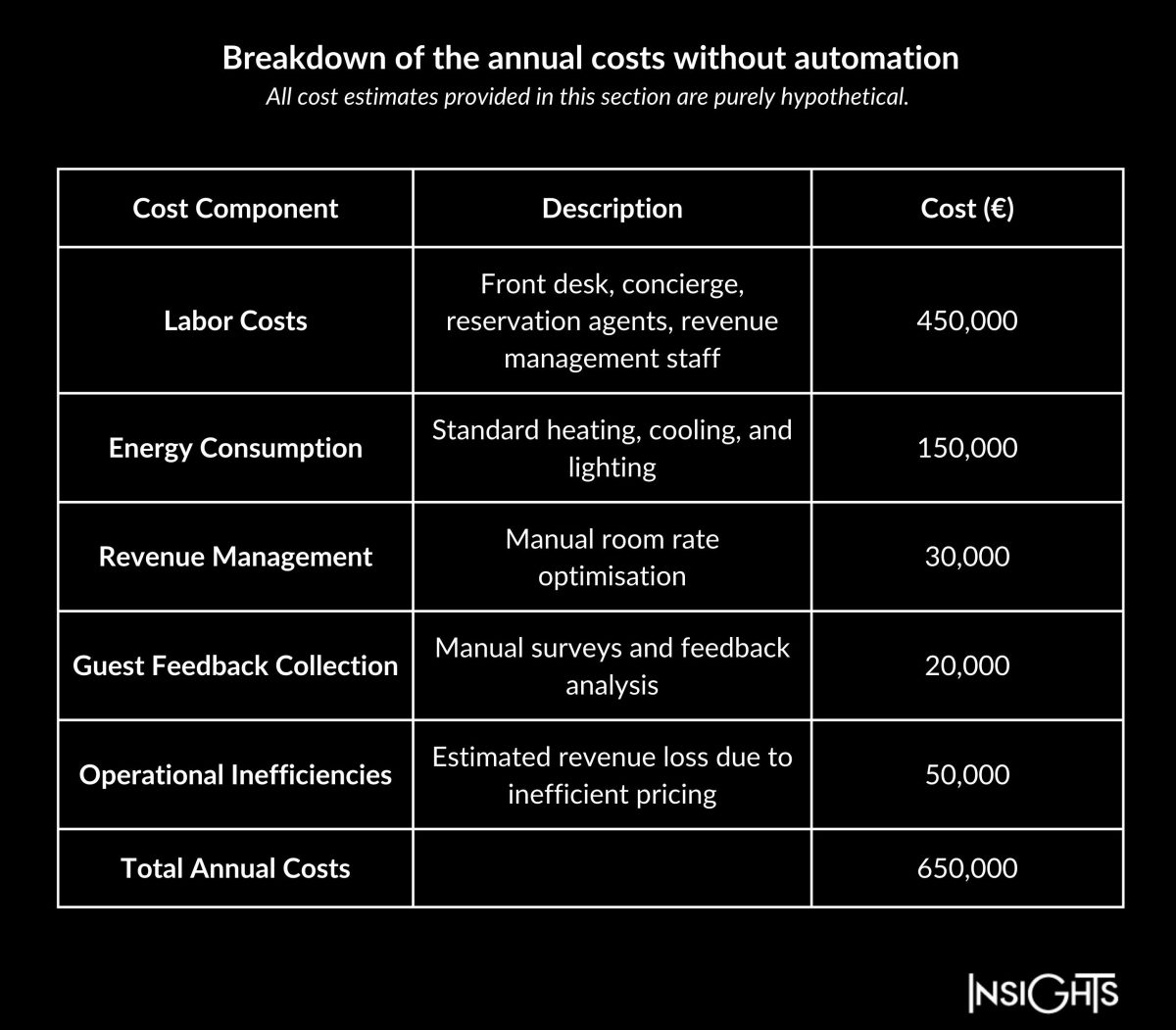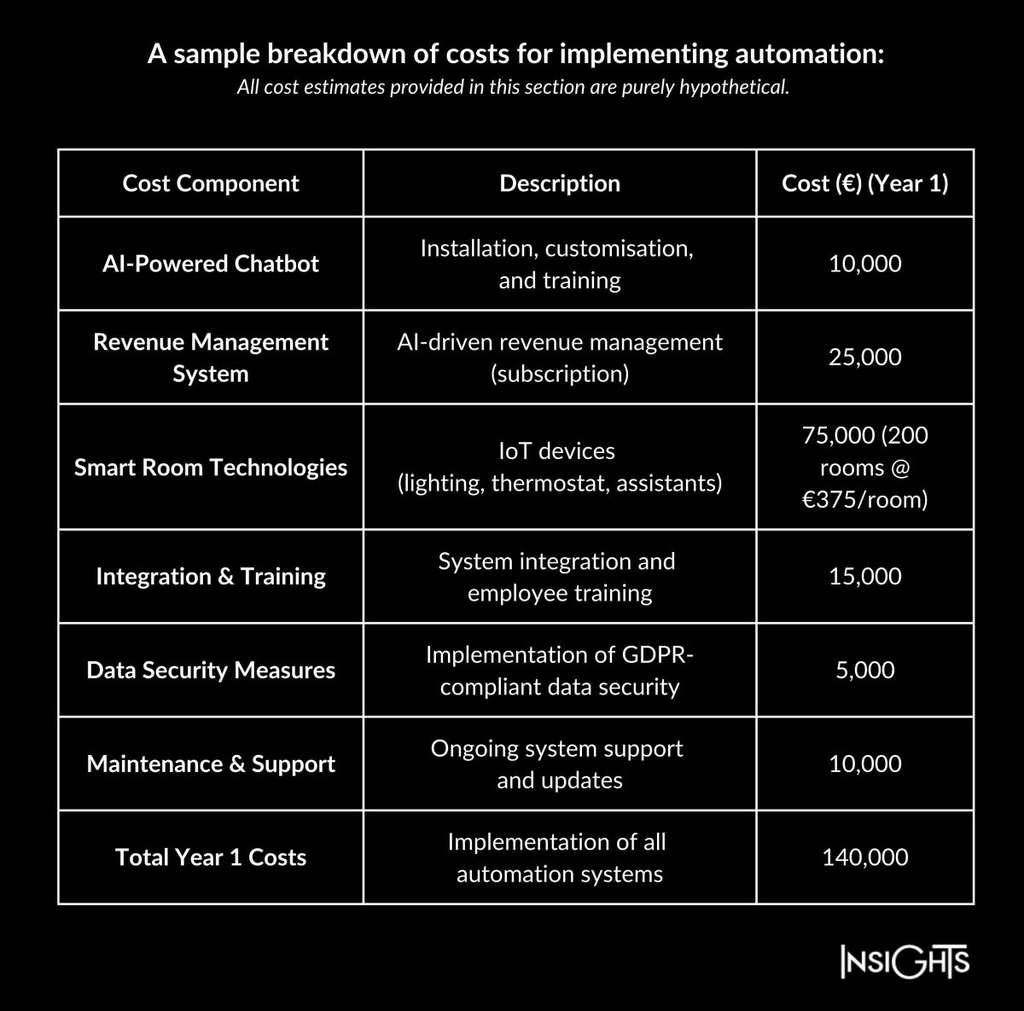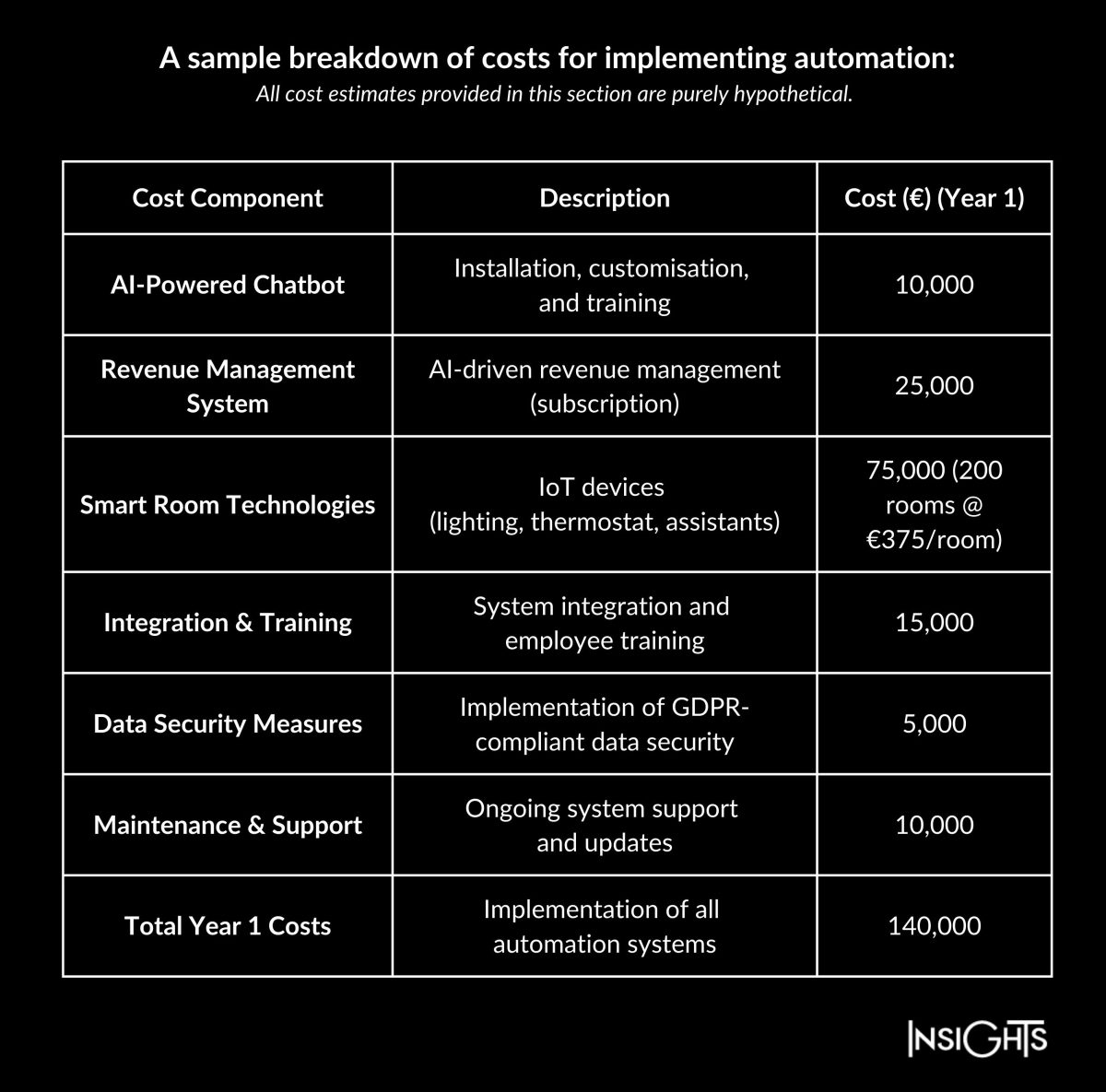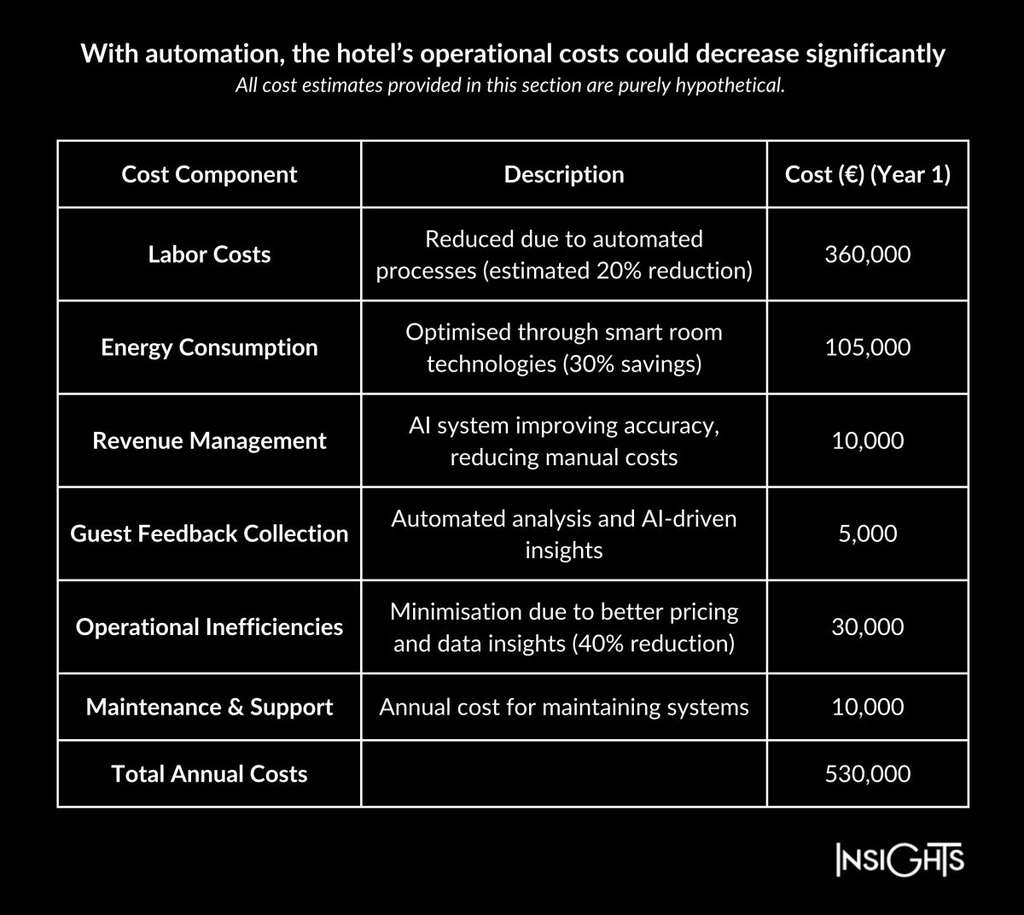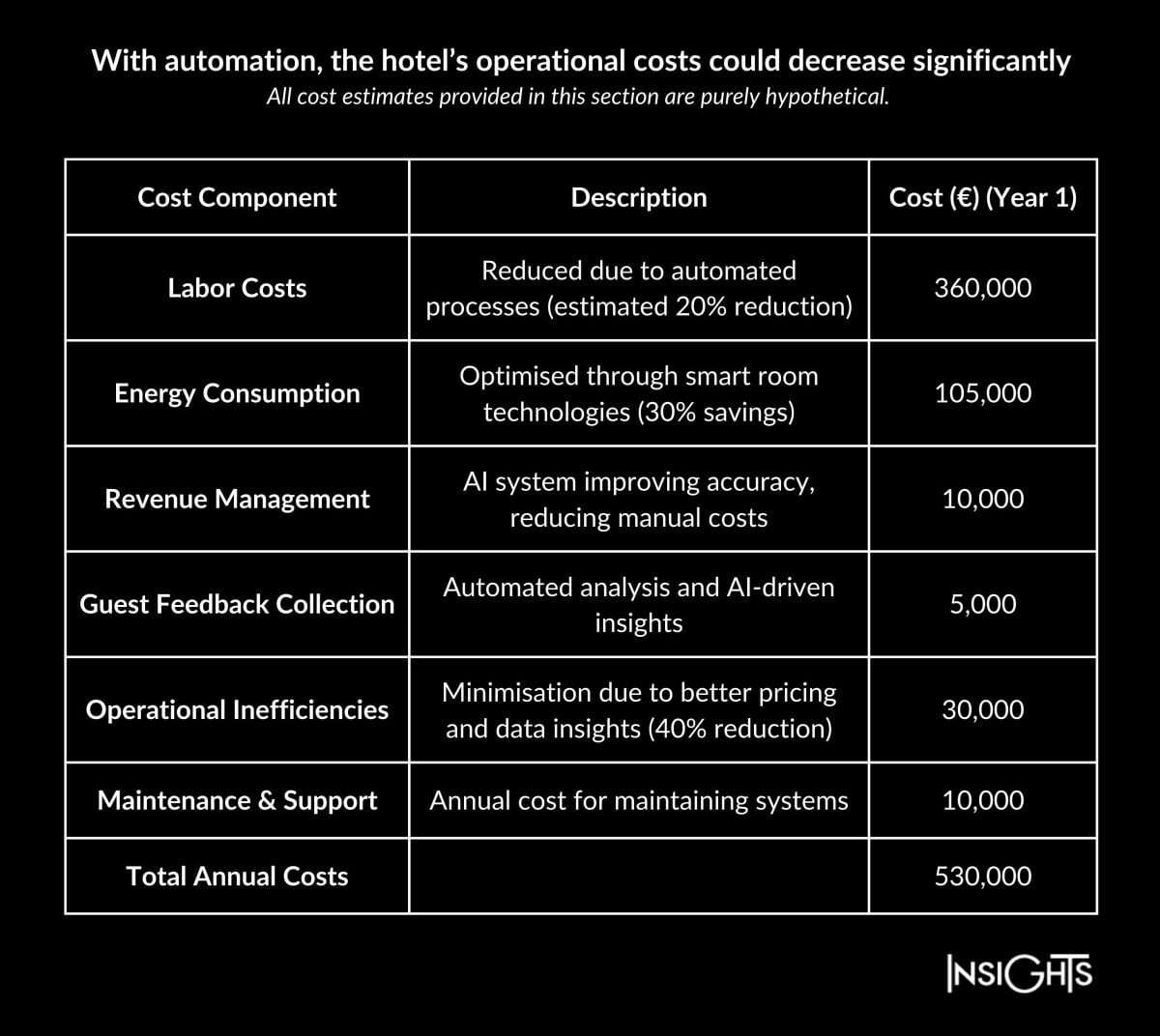Transforming a 200-room hotel with AI and Automation
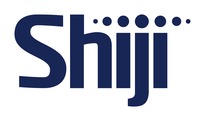
AI and Automation are transforming how hotels operate and engage with guests. Yet, many hotel operational leaders need to be convinced about the value of implementing these technologies. Concerns about return on investment (ROI), operational changes, and guest acceptance are at the forefront of their minds.
This article presents a fictional scenario featuring The Hanson Hotel to illustrate the potential impact of AI and Automation in the hospitality industry. All data, examples, and projections are hypothetical, serving as a framework to explore the advantages, challenges, and financial implications of adopting these technologies in a hotel setting.
Key takeaways
Cost efficiency: AI and Automation cut costs in labour, energy, and revenue management inefficiencies.
Enhanced guest experience: Automation delivers fast responses, personalised rooms, and seamless check-ins, meeting guest expectations.
Manageable changes: Integration requires adjustments, but proper training ensures staff adapt, focusing on guest satisfaction.
Strong ROI: Initial costs are recouped within a year, with ongoing annual savings demonstrating solid ROI.
Sustainability: Smart room technologies reduce energy costs and support sustainability, which appeals to eco-conscious guests.
Seeking Capex approval for AI and Automation
The Hanson Hotel is a four-star, 200-room property located in a bustling European city. Guests stream in and out, staff move quickly to meet their needs, and managers strive to keep everything running smoothly. The IT and Revenue managers want to modernise the hotel and are tasked with convincing their leadership team to invest in AI and Automation.
The leadership team is hesitant, uncertain about the financial justification, and concerned about the impact of change—how staff will adapt, whether guests will embrace the technology and whether the investment will indeed pay off. Yet, with this uncertainty lies the potential for a transformative shift that could deliver the hotel into a new era of efficiency and guest satisfaction.
Understanding the current costs
Operational expenses, from concierge services to maintenance, accumulate behind the scenes. Recognising these costs helps to appreciate how AI and Automation could address challenges managed manually today. The following numbers are a snapshot of the inefficiencies that modern solutions could address.
A summary of the annual costs when automation is not implemented
The AI and Automation solution
In an ideal scenario, advanced technology would blend seamlessly into everyday hotel operations. AI can efficiently address common guest questions instantly. A returning guest checks into their room, which has been pre-set to their preferred temperature of 22°C. The lighting dims just how they like it, and their favourite playlist softly plays in the background. All of this happens without the guest having to ask, thanks to modern hotel technology systems and smart room technologies. Revenue and rates can be optimised with precision-driven data, not guesswork—ensuring that every decision is backed by real-time insights, enhancing guest satisfaction and profitability.
A sample breakdown of costs for implementing automation
Projected costs after AI and Automation
Automation can significantly reduce costs, as shown in these hypothetical estimates.
Year 1 Return on Investment Analysis
- Total operational savings: €120,000
- Implementation costs: €140,000 (Year 1)
- Net impact (Year 1): Due to upfront investment in AI and automation, initial costs exceed savings by €20,000. However, this gap would likely close in subsequent years.
- Net savings (Year 2 onwards): €120,000 annually
Showing value to senior management
Senior leadership hesitates and is concerned about ROI, disruptions, and guest acceptance. To bridge this gap, the IT and Revenue Managers illustrate how AI and Automation can enhance guest experience and efficiency.
They emphasise key benefits that show how AI and Automation can transform The Hanson Hotel to make it a market leader:
Enhanced efficiency and cost savings
Automating repetitive tasks can significantly reduce labour costs. In the above examples, an estimated 20% reduction in labour costs will save €90,000 annually. Automated systems like AI chatbots can handle routine guest inquiries, allowing front desk staff to focus on more complex guest needs. This reduces costs and enhances guest satisfaction by providing quicker responses.
Optimised energy consumption
Smart room technologies, such as automated thermostats and lighting, can help reduce energy consumption by up to 30%. For The Hanson Hotel, this translates to annual savings of €45,000. Automated energy management also contributes to sustainability efforts, which is increasingly important for attracting eco-conscious travellers.
Improved revenue management
AI-driven revenue management systems offer precise pricing strategies based on real-time data, market trends, and demand forecasting. Reducing revenue loss from inefficient pricing could save an estimated €20,000 each year. The system can also dynamically adjust rates to maximise revenue, allowing the hotel to remain competitive.
Streamlined guest feedback collection
Automation significantly enhances the efficiency of feedback collection and analysis in the hospitality industry, allowing hotels to gather real-time insights into guest preferences. Traditionally, hotels might spend around €20,000 on manual survey collection, which includes costs associated with survey creation, data entry, and analysis. With AI-driven solutions, this expense could drop to around €5,000. This cost reduction is attributed to automating data collection and analysis processes, which saves substantial time and resources and delivers faster and more accurate insights. Consequently, this valuable data enables hotels to enhance their services and proactively address guest concerns.
Guest acceptance and experience
Today’s tech-savvy guests expect convenience. AI chatbots offer quick answers, smart rooms allow personalised settings, and automated check-in reduces wait times—all enhancing satisfaction and loyalty.
Addressing operational changes
Implementing AI and Automation will require operational changes, but the benefits outweigh the initial challenges. Here’s how the pair suggested to address concerns about these changes:
System integration and training
Integrating new systems requires an initial investment of time and money. The €15,000 budgeted for integration and training will help staff adapt quickly. Training sessions will focus on making staff comfortable with the new technology, enabling them to use it effectively.
Changes to staff tasks
Automation does not mean replacing staff but rather empowering them. With AI chatbots handling routine inquiries, front desk staff can focus on delivering personalised service. Similarly, with automated revenue management, revenue managers can skip tedious data entry and rate adjustments and focus on strategic decisions. Maintenance staff also benefit, as smart systems can proactively identify maintenance needs, reducing reactive work and allowing the team to focus on preventive measures. This shift will enhance job satisfaction as staff members across departments spend less time on repetitive tasks and more time on impactful guest engagement and proactive operations.
Maintenance and support
Ongoing maintenance is critical to ensure the smooth functioning of automation systems. The €10,000 annual maintenance cost covers system updates, troubleshooting, and support. This proactive approach will help prevent system failures and ensure uninterrupted service for guests.
Conclusion
Embarking on the journey to implement AI and Automation in hotels isn’t just about numbers and spreadsheets—it’s about envisioning a future where technology and hospitality merge seamlessly. Seizing the opportunity to transform any hotel into a business of innovation, where enhanced efficiency harmonises with guest satisfaction and where embracing change cultivates meaningful value.
The hypothetical scenario of the Hanson Hotel demonstrates that AI and Automation are not luxuries—they are the key to unlocking significant cost savings, driving operational efficiency, and improving the overall guest experience. These factors make a compelling case for capex approval, turning what seems like a risk into an opportunity for growth.
AI and Automation are rapidly becoming essential tools for modern hospitality. By implementing these technologies, hotels can cut costs, enhance guest experiences, and empower staff to focus on meaningful interactions. This transition drives efficiency and positions hotels to stay competitive in a rapidly evolving industry.
- Transforming a 200-room hotel with AI and Automation
- Beyond Bier and Weißwurst: Cheers to Reviews
- Friction to Flow – Payment Innovations in Hospitality
- Guest Satisfaction Rises Amid Global Review Volume Shifts: Insights on Guest Experience Q3 2024
- Q3 2024 Guest Experience Benchmark Infographics
Footnote: All examples and numbers used in this article are hypothetical and do not represent any real-world hotel. Any hotel considering implementing automation and AI should conduct its own detailed analysis and financial impact assessments.
Sources: HospitalityNet, Skift, Verdant Energy Management, STR Global, Energy Star.
About Shiji Group
Shiji is a global technology company dedicated to providing innovative solutions for the hospitality industry, ensuring seamless operations for hoteliers day and night. Built on the Shiji Platform—the only truly global hotel technology platform—Shiji's cloud-based solutions include property management system, point-of-sale, guest engagement, distribution, payments, and data intelligence for over 91,000 hotels worldwide, including the largest hotel chains. With more than 5,000 employees across the world, Shiji is a trusted partner for the world's leading hoteliers, delivering technology that works as continuously as the industry itself. That's why the best hotels run on Shiji—day and night. While its primary focus is on hospitality, Shiji also serves select customers in food service, retail, and entertainment in certain regions. For more information, visit shijigroup.com.


